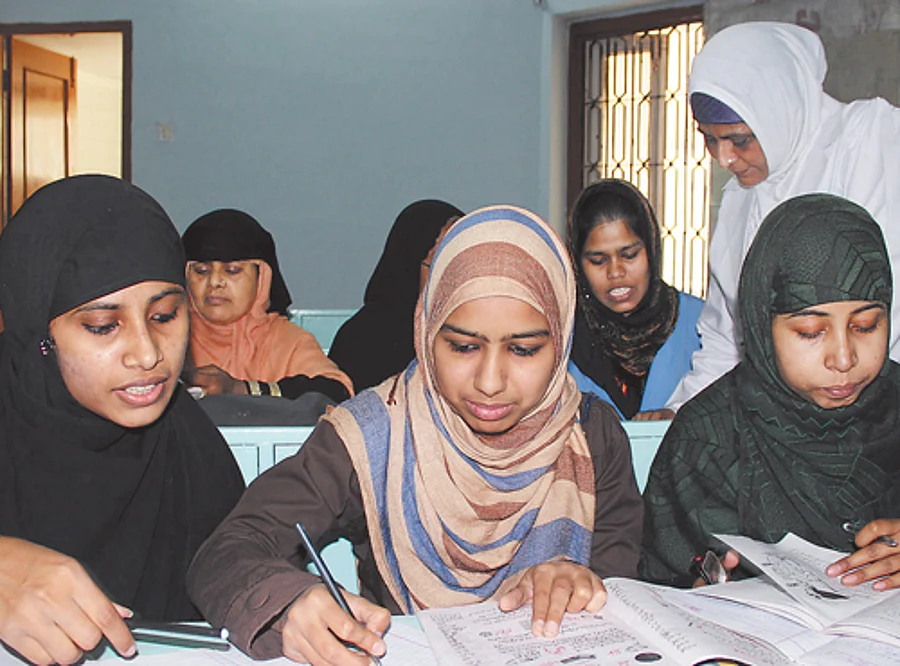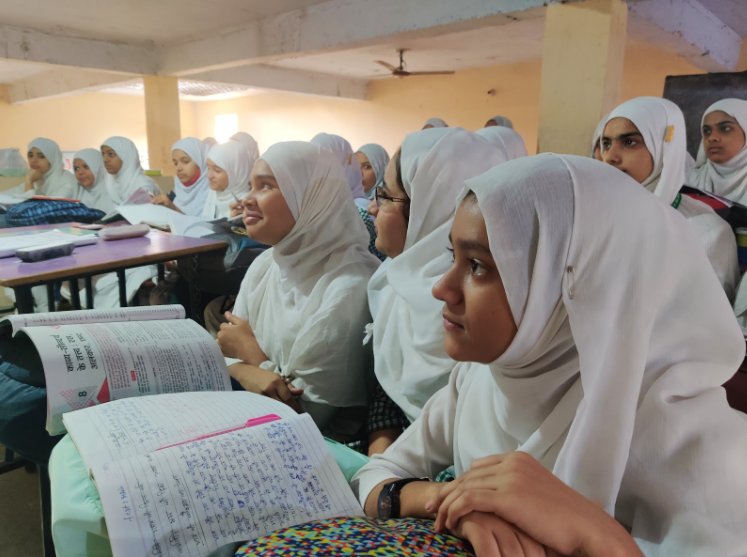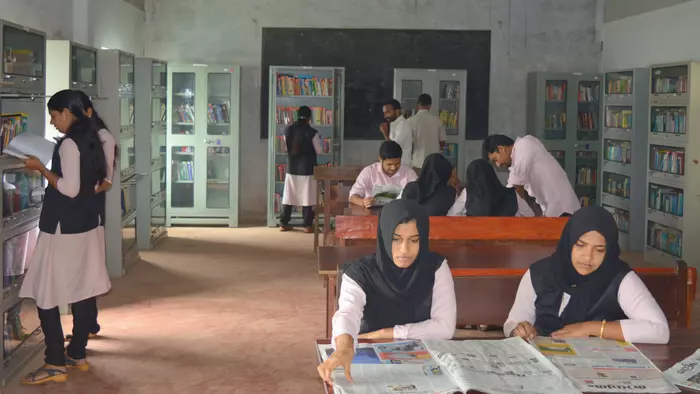A new storyline has begun to emerge in India’s Muslim community in recent years: young women educated in madrasas are increasingly breaking the stereotype of solely learning the Quran by learning computer coding, app development, and artificial intelligence (AI). In response to state-led initiatives, NGO programmes, and the efforts of local entrepreneurs, young women from states such as Uttar Pradesh, Kerala, and Telangana now have opportunities to learn coding and technology in bootcamps. This “Quran-and-laptop” agenda signals a clear and sustained shift in curriculum and attitudes in parts of the community.
The UP government has claimed that it has changed the syllabus of Madarsa “in order to connect students with the mainstream” and began offering launch classes in digital literacy, coding, and AI. UP Minister Dharampal Singh claimed that the state government wanted “children of poor Muslims [to have] a Quran in one hand and a laptop in the other” as part of a wider agenda to train students in madrasas “to become engineers, scientists, [and] IAS officers”.
NGOs and grassroots empowerment models
In addition to revised curricula, a wave of NGOs, community organisations, and ed-tech companies continues to emerge to provide digital skills training to Muslim women. The Hyderabad-based SAFA Foundation, under social entrepreneur Rubina Mazhar, supports women through ICT and coding training programmes. SAFA offers “women’s programmes which upgrade the skills of women…in…computer-based courses, information technology-enabled services…to create opportunities for livelihood for women living in poverty.” Rubina notes, “This section of society is in need of empowerment so that they may realise their value and potential.” Success stories of SAFA students are emerging in the workplace: following training, they have transitioned into IT support and data-entry jobs, allowing them the chance to earn and keep their income.

In Telangana state, the Shadan Women’s College (an engineering college that prioritises students from a Muslim minority) is now offering full-stack web development and AI workshops to their women students. Even within formal schooling, a grassroots effort seems to be emerging: in Malappuram, a district of Kerala, local educators united to engage and teach 7th grade girls (many from Madrasa backgrounds) in a maths-coding-AI summer camp, where they programmed in Python and learnt about the mathematics underlying AI.
Changing family attitudes and cultural resistance
Such programmes often appear as a twist towards the end of the family and community stories. Many parents are becoming more open, slowly changing their views about ‘secular education’. As one educator explains, ‘Families expecting only religious schooling for their children have been “happy with the training and assistance in job placement”.’ Scholars have noted that Muslim women in India are “doubly marginalised” by virtue of being a woman and a Muslim and therefore both consciously and unconsciously discriminated against in work and education.
In Telangana state, the Shadan Women’s College (an engineering college that prioritises students from a Muslim minority) is now offering full-stack web development and AI workshops to their women students.
Recent research has even revisited the labour force participation of Muslim women, which is the lowest of all groups and their ongoing hiring discrimination. In this environment, digital skills become doubly empowering: employment in tech-associated jobs can often be done flexibly and sometimes at home, lessening the impact on family and the security for conservative families.
Educational organisations and industry mentors have also observed effects beyond the participants. Educators leading the courses in Hyderabad reported that the Muslim women trainees were “very happy” with their newly acquired skills and were excited about their tech careers. Local university professors state that, as women who were previously in environments that discouraged them, they contribute a different perspective to class projects now as female coders. Indeed, some of the local employers have been observing this situation too and some have even reached out to NGOs like SAFA to recruit these trained women for entry-level IT jobs.
Feminist implications: redefining identity and agency
This wave of madrasa-to-tech occupations raises broader questions about inclusion and economic mobility. By integrating religious institutions of formal education with coding, this trend cites Islamiology in a modernist project of identity politics: women do not have to choose between being religious and pursuing modern jobs. Many see Muslim women coders as images of “successful identity”, resisting patriarchal definitions of how women behave and teaching younger girls that religious piety and professional aspiration are compatible.
Case studies and key examples
In October 2023, the state announced that all madrasa ‘(Islamic school)’ curricula starting January 2024 would include a digital literacy, coding, and AI module. Hundreds of madrasas have since received computers and study kits to empower the new curriculum. In a press release, UP’s Minority Waqf minister stated the aim is to help students from madrasas to be mainstream.
Malappuram’s Women’s College of Engineering ran an April-May 2024 summer camp, teaching Python and AI concepts to schoolgirls, many from madrasas. In Malappuram, social entrepreneurs started bilingual coding clubs and offered online courses for Muslim girls.
Initial evidence suggests a modest impact: dozens of Muslim women from UP and Telangana have landed IT jobs or internships after completing intensive courses.
SAFA Foundation (est. 2006), located in Hyderabad, offers ICT and coding classes across vocational programmes. Graduates report finding jobs or freelance work. Shadan Women’s College (a Muslim minority engineering college in Hyderabad) signed papers of understanding (MOUs) with tech-training firms and transitioned students in 2023 to “full-stack development” workshops, similar to the curriculum offered at Shadan Women’s College.
Curriculum innovations
In addition to IT training, a number of madrasa boards and colleges are changing syllabi. The Tata Trusts’ Madrasa Programme (which will expand to UP, Bihar, and Jharkhand by 2024) has also developed project-based learning combining Islamic themes with STEM – for example, students map the narratives of the Prophet from Sira to examine geography and geometry. Furthermore, Muslim charitable schools (madrasas) in Kerala have begun teaching the English alphabet, mathematics, and computing basics during evening classes, including Quran recitation.
Gender and religious identity make the process complicated. Some conservative parents are still sceptical of co-educational or mixed-gender format classes—so organisers found a way to run gender-segregated classes. Some religious leaders have asked why madrasas should teach “Western” subjects. But in many families, the reality of the economy is upsetting this resistance: fathers and brothers who once insisted on sons’ education are now insisting their daughters participate and learn IT skills. An educator told me that Muslim girls winning coding competitions or landing software jobs can “change even the most doubtful parent’s mind.”

The teacher who trained the girls in the madrasa reports that many of the girls have high motivation. Many of them feel a new confidence in developing their math and logic skills. The college and tech schools, in fact, would put them in groups and comment on how these students demonstrated excellent discipline and ethics for team projects. The industry mentors stated that the awareness piece is more difficult than the possible skill gap: many Muslim women do not know these opportunities exist. Now colleges and non-profit organisations are working to develop awareness campaigns for mosques, madrasas, and local media.
Initial evidence suggests a modest impact: dozens of Muslim women from UP and Telangana have landed IT jobs or internships after completing intensive courses. In Kerala, at least one woman formerly of madrasa origin won the statewide coding competition in 2024. Observers expect that if additional examples emerge, peer impact will take over. In the end, the incorporation of technology into madrasas could spur ripple effects — provide a pathway to women’s economic mobility and challenge normative stereotypes in the Muslim community.
The new wave of Muslim women transitioning from madrasas to coding labs is deserving of careful attention. In addition to being a collection of personal success stories, it is the beginning of a quiet social change. By combining religious education with coding skills, India is experiencing a new kind of agency — the growth of women who feel they can be both faithful and modern. Indeed, these efforts—some of which started by state reforms, collaborations of NGOs, or by some community entrepreneurs—are changing cultural expectations and providing new routes into economic mobility. If the new “Quran and laptop” generation is allowed to scale and expand, they not only may cause a transformation in the lives of Muslim women, but they may also be able to contribute to India’s digital economy, which is (as it is often said) still just beginning.




